Analysing Globalisation's Impact on SASOL Ltd.'s Business Strategy
VerifiedAdded on 2023/06/18
|11
|3378
|174
Report
AI Summary
This report examines the influence of globalisation on SASOL Limited, a chemical and gas energy business, focusing on its impact on the company's culture, structure, leadership styles, organisational functions, and decision-making processes. It applies McKinsey’s 7s Model and Hofstede's Cultural Dimensions Model to evaluate SASOL's strategies, structure, shared values, leadership style, staff skills, and cultural adaptability. The report also discusses the influence of ethical and sustainable globalisation on organisational functions such as marketing, finance, HRM, and operations. It critically evaluates the impact of globalisation on organisational culture and structure, highlighting the importance of cultural analysis for effective performance in foreign markets. Furthermore, the report explores the influence of globalisation on decision-making and suggests ways to enhance its effectiveness, including adapting appropriate leadership styles and managing risks. Finally, it discusses various modes of internationalisation for SASOL Limited and identifies key barriers, offering recommendations to overcome them. Desklib provides access to this and other solved assignments for students.
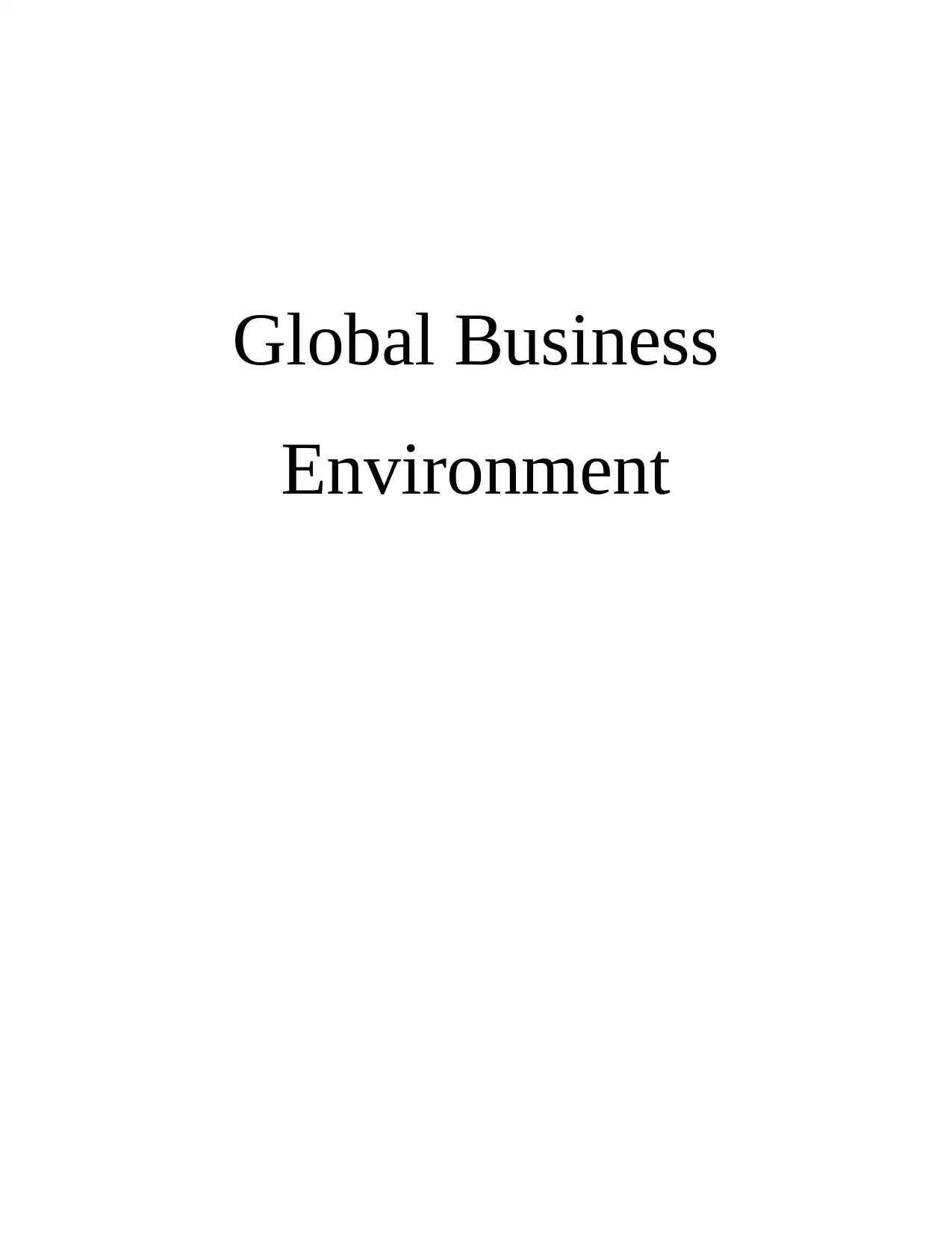
Global Business
Environment
Environment
Paraphrase This Document
Need a fresh take? Get an instant paraphrase of this document with our AI Paraphraser
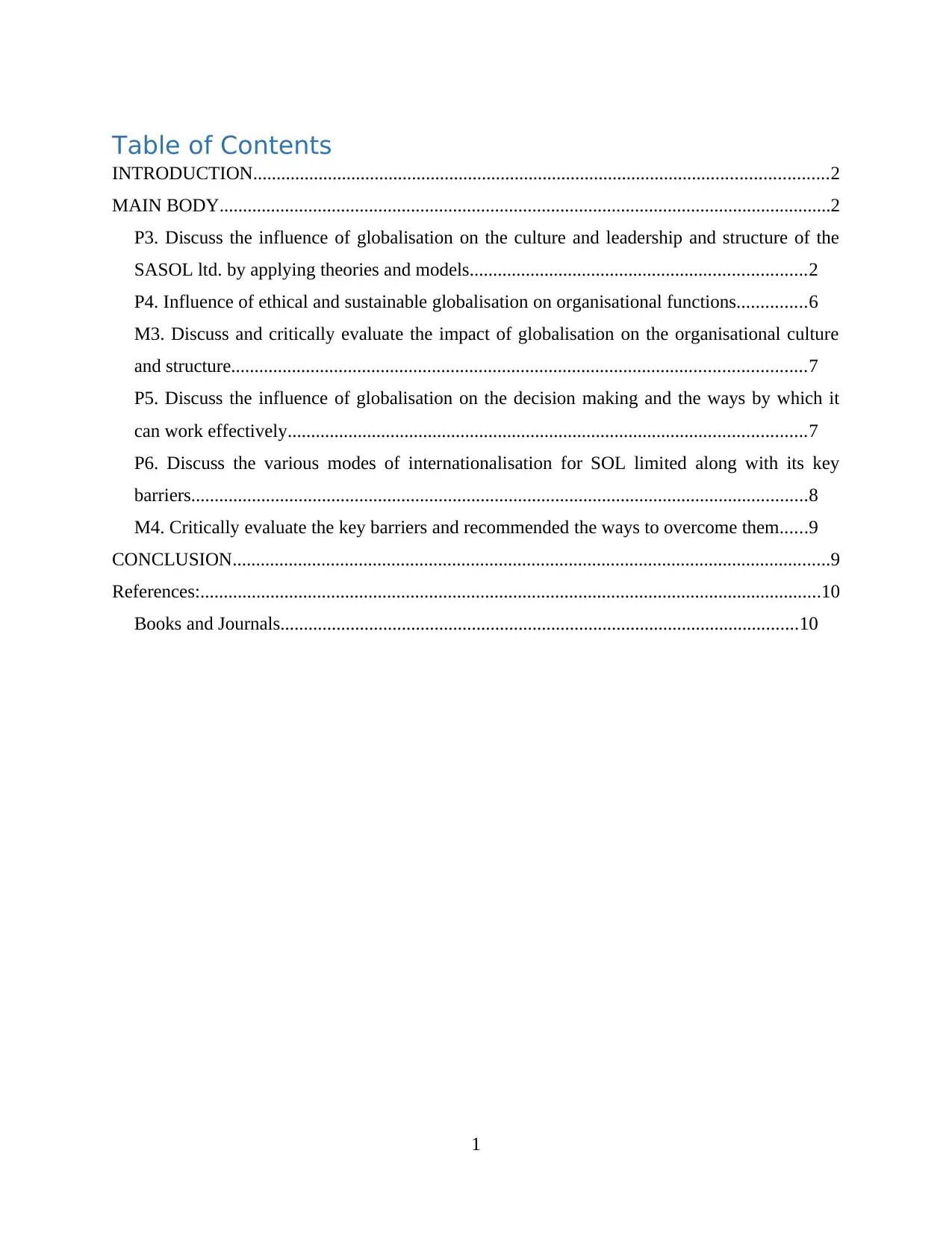
Table of Contents
INTRODUCTION...........................................................................................................................2
MAIN BODY...................................................................................................................................2
P3. Discuss the influence of globalisation on the culture and leadership and structure of the
SASOL ltd. by applying theories and models........................................................................2
P4. Influence of ethical and sustainable globalisation on organisational functions...............6
M3. Discuss and critically evaluate the impact of globalisation on the organisational culture
and structure...........................................................................................................................7
P5. Discuss the influence of globalisation on the decision making and the ways by which it
can work effectively...............................................................................................................7
P6. Discuss the various modes of internationalisation for SOL limited along with its key
barriers....................................................................................................................................8
M4. Critically evaluate the key barriers and recommended the ways to overcome them......9
CONCLUSION................................................................................................................................9
References:.....................................................................................................................................10
Books and Journals...............................................................................................................10
1
INTRODUCTION...........................................................................................................................2
MAIN BODY...................................................................................................................................2
P3. Discuss the influence of globalisation on the culture and leadership and structure of the
SASOL ltd. by applying theories and models........................................................................2
P4. Influence of ethical and sustainable globalisation on organisational functions...............6
M3. Discuss and critically evaluate the impact of globalisation on the organisational culture
and structure...........................................................................................................................7
P5. Discuss the influence of globalisation on the decision making and the ways by which it
can work effectively...............................................................................................................7
P6. Discuss the various modes of internationalisation for SOL limited along with its key
barriers....................................................................................................................................8
M4. Critically evaluate the key barriers and recommended the ways to overcome them......9
CONCLUSION................................................................................................................................9
References:.....................................................................................................................................10
Books and Journals...............................................................................................................10
1
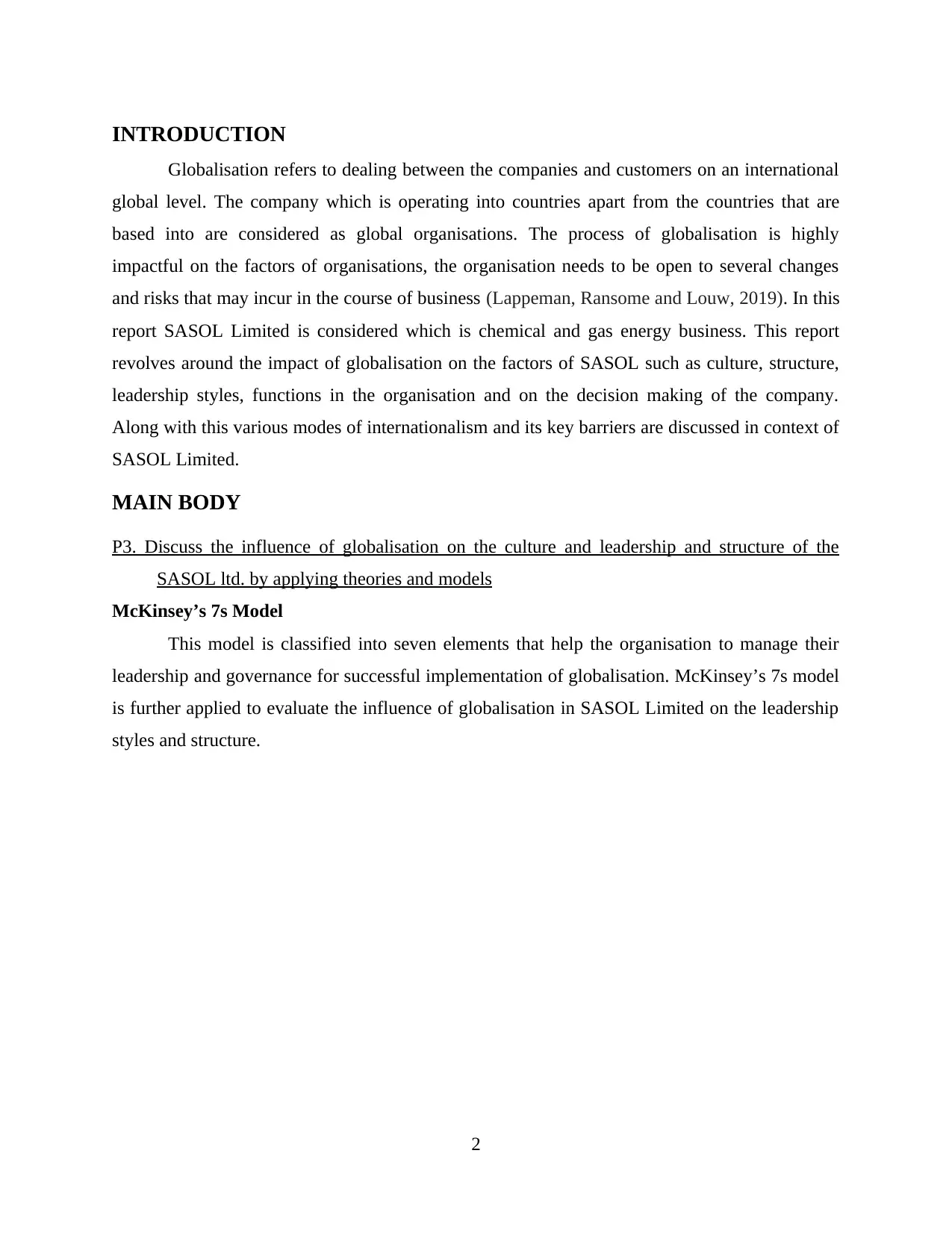
INTRODUCTION
Globalisation refers to dealing between the companies and customers on an international
global level. The company which is operating into countries apart from the countries that are
based into are considered as global organisations. The process of globalisation is highly
impactful on the factors of organisations, the organisation needs to be open to several changes
and risks that may incur in the course of business (Lappeman, Ransome and Louw, 2019). In this
report SASOL Limited is considered which is chemical and gas energy business. This report
revolves around the impact of globalisation on the factors of SASOL such as culture, structure,
leadership styles, functions in the organisation and on the decision making of the company.
Along with this various modes of internationalism and its key barriers are discussed in context of
SASOL Limited.
MAIN BODY
P3. Discuss the influence of globalisation on the culture and leadership and structure of the
SASOL ltd. by applying theories and models
McKinsey’s 7s Model
This model is classified into seven elements that help the organisation to manage their
leadership and governance for successful implementation of globalisation. McKinsey’s 7s model
is further applied to evaluate the influence of globalisation in SASOL Limited on the leadership
styles and structure.
2
Globalisation refers to dealing between the companies and customers on an international
global level. The company which is operating into countries apart from the countries that are
based into are considered as global organisations. The process of globalisation is highly
impactful on the factors of organisations, the organisation needs to be open to several changes
and risks that may incur in the course of business (Lappeman, Ransome and Louw, 2019). In this
report SASOL Limited is considered which is chemical and gas energy business. This report
revolves around the impact of globalisation on the factors of SASOL such as culture, structure,
leadership styles, functions in the organisation and on the decision making of the company.
Along with this various modes of internationalism and its key barriers are discussed in context of
SASOL Limited.
MAIN BODY
P3. Discuss the influence of globalisation on the culture and leadership and structure of the
SASOL ltd. by applying theories and models
McKinsey’s 7s Model
This model is classified into seven elements that help the organisation to manage their
leadership and governance for successful implementation of globalisation. McKinsey’s 7s model
is further applied to evaluate the influence of globalisation in SASOL Limited on the leadership
styles and structure.
2
⊘ This is a preview!⊘
Do you want full access?
Subscribe today to unlock all pages.

Trusted by 1+ million students worldwide
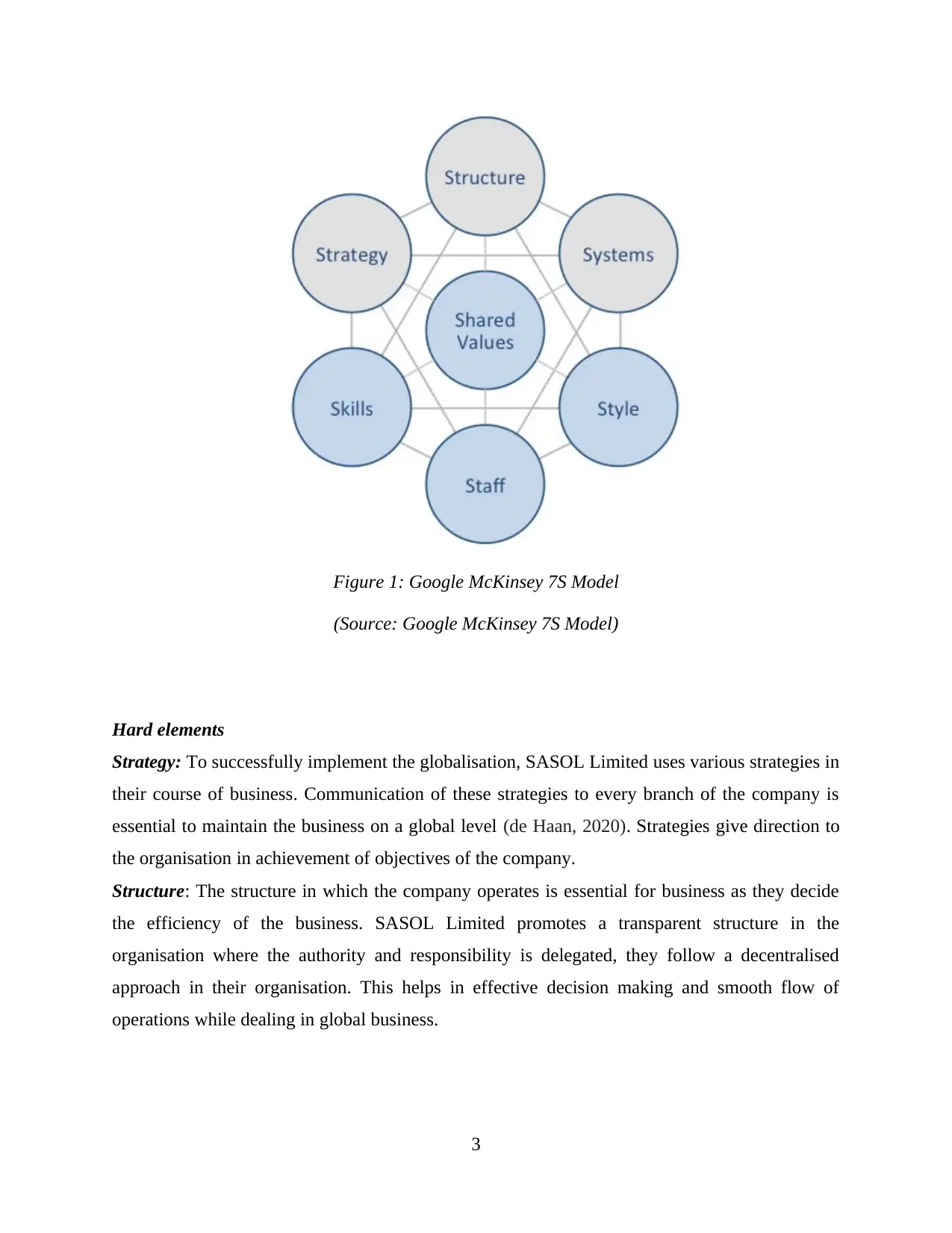
Figure 1: Google McKinsey 7S Model
(Source: Google McKinsey 7S Model)
Hard elements
Strategy: To successfully implement the globalisation, SASOL Limited uses various strategies in
their course of business. Communication of these strategies to every branch of the company is
essential to maintain the business on a global level (de Haan, 2020). Strategies give direction to
the organisation in achievement of objectives of the company.
Structure: The structure in which the company operates is essential for business as they decide
the efficiency of the business. SASOL Limited promotes a transparent structure in the
organisation where the authority and responsibility is delegated, they follow a decentralised
approach in their organisation. This helps in effective decision making and smooth flow of
operations while dealing in global business.
3
(Source: Google McKinsey 7S Model)
Hard elements
Strategy: To successfully implement the globalisation, SASOL Limited uses various strategies in
their course of business. Communication of these strategies to every branch of the company is
essential to maintain the business on a global level (de Haan, 2020). Strategies give direction to
the organisation in achievement of objectives of the company.
Structure: The structure in which the company operates is essential for business as they decide
the efficiency of the business. SASOL Limited promotes a transparent structure in the
organisation where the authority and responsibility is delegated, they follow a decentralised
approach in their organisation. This helps in effective decision making and smooth flow of
operations while dealing in global business.
3
Paraphrase This Document
Need a fresh take? Get an instant paraphrase of this document with our AI Paraphraser
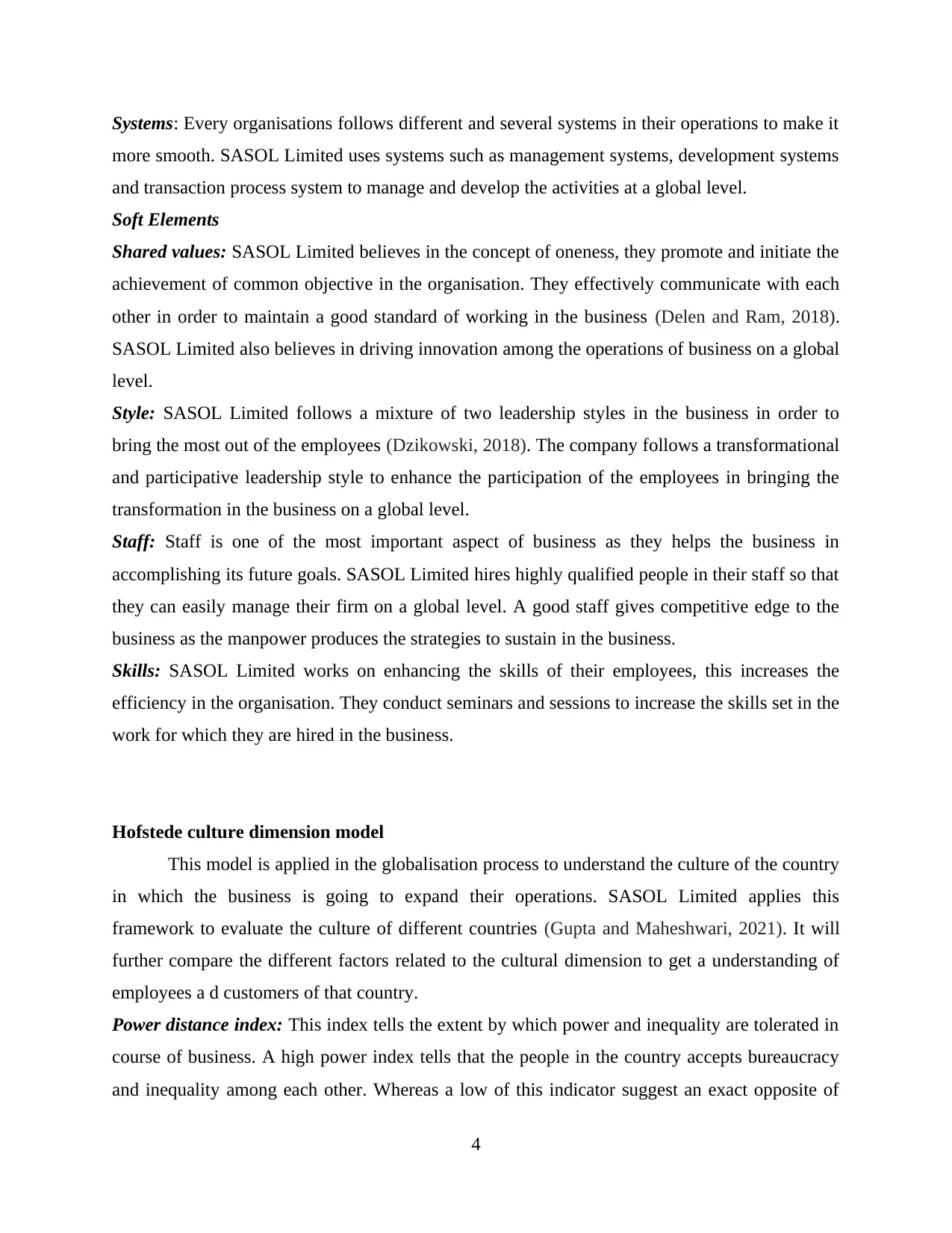
Systems: Every organisations follows different and several systems in their operations to make it
more smooth. SASOL Limited uses systems such as management systems, development systems
and transaction process system to manage and develop the activities at a global level.
Soft Elements
Shared values: SASOL Limited believes in the concept of oneness, they promote and initiate the
achievement of common objective in the organisation. They effectively communicate with each
other in order to maintain a good standard of working in the business (Delen and Ram, 2018).
SASOL Limited also believes in driving innovation among the operations of business on a global
level.
Style: SASOL Limited follows a mixture of two leadership styles in the business in order to
bring the most out of the employees (Dzikowski, 2018). The company follows a transformational
and participative leadership style to enhance the participation of the employees in bringing the
transformation in the business on a global level.
Staff: Staff is one of the most important aspect of business as they helps the business in
accomplishing its future goals. SASOL Limited hires highly qualified people in their staff so that
they can easily manage their firm on a global level. A good staff gives competitive edge to the
business as the manpower produces the strategies to sustain in the business.
Skills: SASOL Limited works on enhancing the skills of their employees, this increases the
efficiency in the organisation. They conduct seminars and sessions to increase the skills set in the
work for which they are hired in the business.
Hofstede culture dimension model
This model is applied in the globalisation process to understand the culture of the country
in which the business is going to expand their operations. SASOL Limited applies this
framework to evaluate the culture of different countries (Gupta and Maheshwari, 2021). It will
further compare the different factors related to the cultural dimension to get a understanding of
employees a d customers of that country.
Power distance index: This index tells the extent by which power and inequality are tolerated in
course of business. A high power index tells that the people in the country accepts bureaucracy
and inequality among each other. Whereas a low of this indicator suggest an exact opposite of
4
more smooth. SASOL Limited uses systems such as management systems, development systems
and transaction process system to manage and develop the activities at a global level.
Soft Elements
Shared values: SASOL Limited believes in the concept of oneness, they promote and initiate the
achievement of common objective in the organisation. They effectively communicate with each
other in order to maintain a good standard of working in the business (Delen and Ram, 2018).
SASOL Limited also believes in driving innovation among the operations of business on a global
level.
Style: SASOL Limited follows a mixture of two leadership styles in the business in order to
bring the most out of the employees (Dzikowski, 2018). The company follows a transformational
and participative leadership style to enhance the participation of the employees in bringing the
transformation in the business on a global level.
Staff: Staff is one of the most important aspect of business as they helps the business in
accomplishing its future goals. SASOL Limited hires highly qualified people in their staff so that
they can easily manage their firm on a global level. A good staff gives competitive edge to the
business as the manpower produces the strategies to sustain in the business.
Skills: SASOL Limited works on enhancing the skills of their employees, this increases the
efficiency in the organisation. They conduct seminars and sessions to increase the skills set in the
work for which they are hired in the business.
Hofstede culture dimension model
This model is applied in the globalisation process to understand the culture of the country
in which the business is going to expand their operations. SASOL Limited applies this
framework to evaluate the culture of different countries (Gupta and Maheshwari, 2021). It will
further compare the different factors related to the cultural dimension to get a understanding of
employees a d customers of that country.
Power distance index: This index tells the extent by which power and inequality are tolerated in
course of business. A high power index tells that the people in the country accepts bureaucracy
and inequality among each other. Whereas a low of this indicator suggest an exact opposite of
4
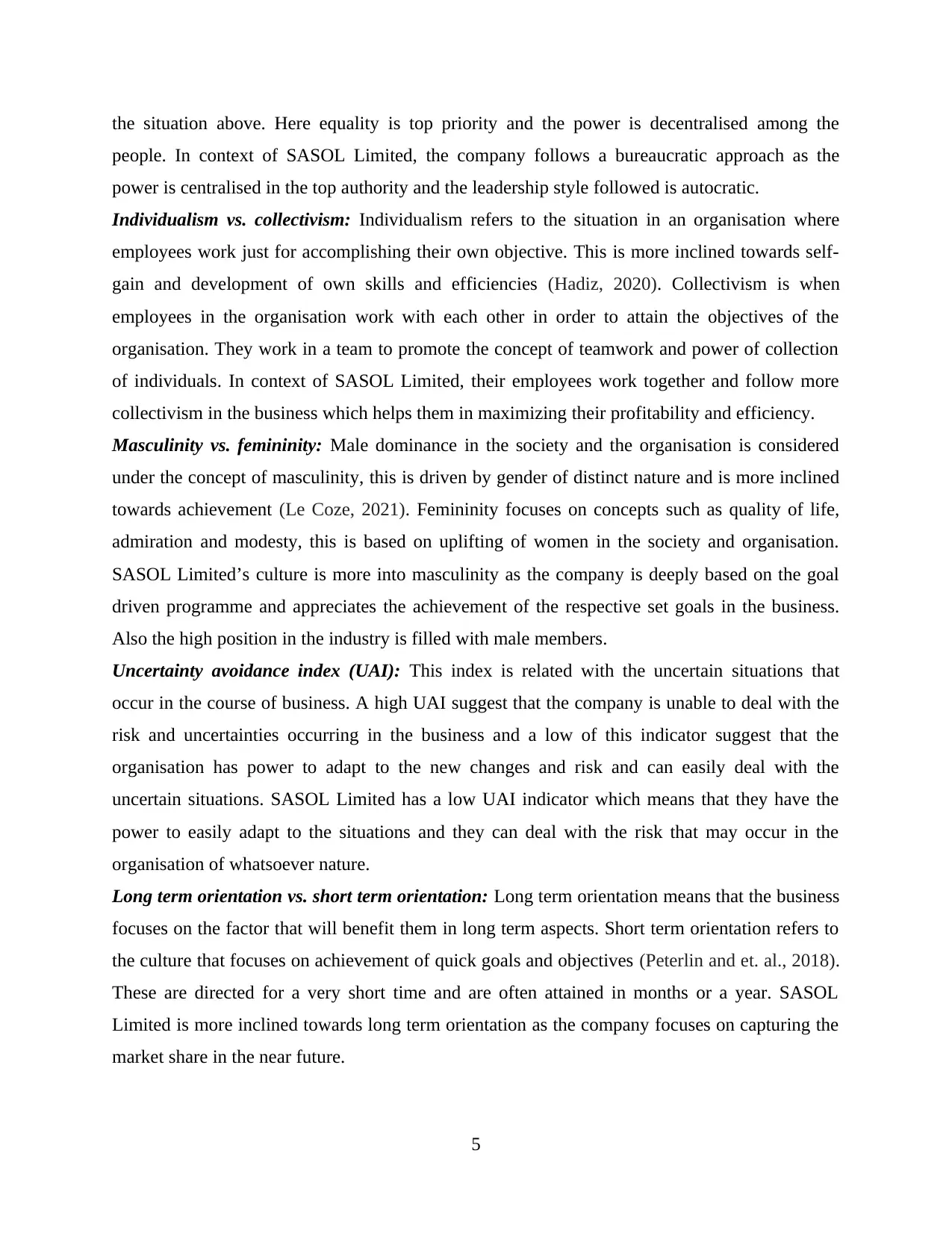
the situation above. Here equality is top priority and the power is decentralised among the
people. In context of SASOL Limited, the company follows a bureaucratic approach as the
power is centralised in the top authority and the leadership style followed is autocratic.
Individualism vs. collectivism: Individualism refers to the situation in an organisation where
employees work just for accomplishing their own objective. This is more inclined towards self-
gain and development of own skills and efficiencies (Hadiz, 2020). Collectivism is when
employees in the organisation work with each other in order to attain the objectives of the
organisation. They work in a team to promote the concept of teamwork and power of collection
of individuals. In context of SASOL Limited, their employees work together and follow more
collectivism in the business which helps them in maximizing their profitability and efficiency.
Masculinity vs. femininity: Male dominance in the society and the organisation is considered
under the concept of masculinity, this is driven by gender of distinct nature and is more inclined
towards achievement (Le Coze, 2021). Femininity focuses on concepts such as quality of life,
admiration and modesty, this is based on uplifting of women in the society and organisation.
SASOL Limited’s culture is more into masculinity as the company is deeply based on the goal
driven programme and appreciates the achievement of the respective set goals in the business.
Also the high position in the industry is filled with male members.
Uncertainty avoidance index (UAI): This index is related with the uncertain situations that
occur in the course of business. A high UAI suggest that the company is unable to deal with the
risk and uncertainties occurring in the business and a low of this indicator suggest that the
organisation has power to adapt to the new changes and risk and can easily deal with the
uncertain situations. SASOL Limited has a low UAI indicator which means that they have the
power to easily adapt to the situations and they can deal with the risk that may occur in the
organisation of whatsoever nature.
Long term orientation vs. short term orientation: Long term orientation means that the business
focuses on the factor that will benefit them in long term aspects. Short term orientation refers to
the culture that focuses on achievement of quick goals and objectives (Peterlin and et. al., 2018).
These are directed for a very short time and are often attained in months or a year. SASOL
Limited is more inclined towards long term orientation as the company focuses on capturing the
market share in the near future.
5
people. In context of SASOL Limited, the company follows a bureaucratic approach as the
power is centralised in the top authority and the leadership style followed is autocratic.
Individualism vs. collectivism: Individualism refers to the situation in an organisation where
employees work just for accomplishing their own objective. This is more inclined towards self-
gain and development of own skills and efficiencies (Hadiz, 2020). Collectivism is when
employees in the organisation work with each other in order to attain the objectives of the
organisation. They work in a team to promote the concept of teamwork and power of collection
of individuals. In context of SASOL Limited, their employees work together and follow more
collectivism in the business which helps them in maximizing their profitability and efficiency.
Masculinity vs. femininity: Male dominance in the society and the organisation is considered
under the concept of masculinity, this is driven by gender of distinct nature and is more inclined
towards achievement (Le Coze, 2021). Femininity focuses on concepts such as quality of life,
admiration and modesty, this is based on uplifting of women in the society and organisation.
SASOL Limited’s culture is more into masculinity as the company is deeply based on the goal
driven programme and appreciates the achievement of the respective set goals in the business.
Also the high position in the industry is filled with male members.
Uncertainty avoidance index (UAI): This index is related with the uncertain situations that
occur in the course of business. A high UAI suggest that the company is unable to deal with the
risk and uncertainties occurring in the business and a low of this indicator suggest that the
organisation has power to adapt to the new changes and risk and can easily deal with the
uncertain situations. SASOL Limited has a low UAI indicator which means that they have the
power to easily adapt to the situations and they can deal with the risk that may occur in the
organisation of whatsoever nature.
Long term orientation vs. short term orientation: Long term orientation means that the business
focuses on the factor that will benefit them in long term aspects. Short term orientation refers to
the culture that focuses on achievement of quick goals and objectives (Peterlin and et. al., 2018).
These are directed for a very short time and are often attained in months or a year. SASOL
Limited is more inclined towards long term orientation as the company focuses on capturing the
market share in the near future.
5
⊘ This is a preview!⊘
Do you want full access?
Subscribe today to unlock all pages.

Trusted by 1+ million students worldwide
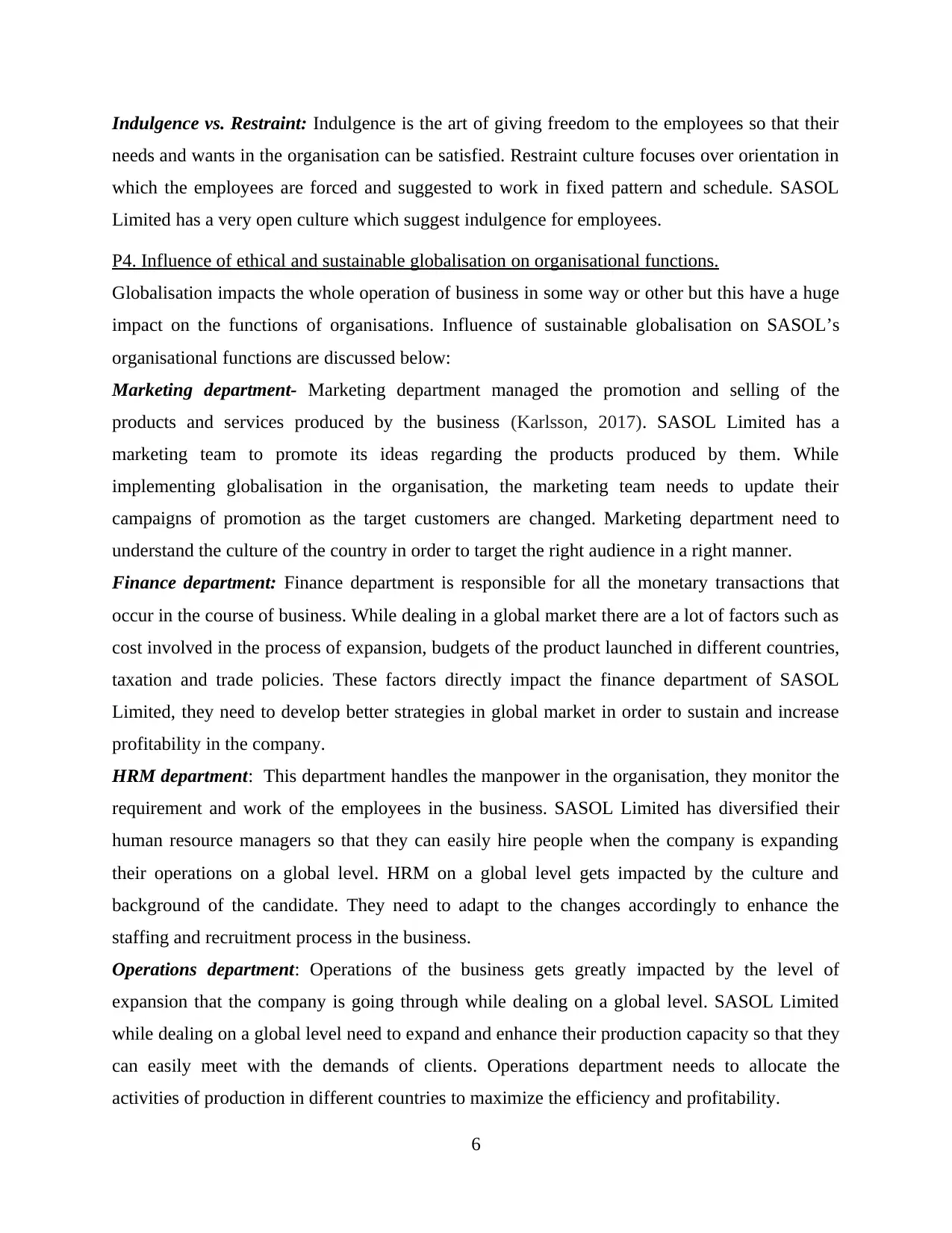
Indulgence vs. Restraint: Indulgence is the art of giving freedom to the employees so that their
needs and wants in the organisation can be satisfied. Restraint culture focuses over orientation in
which the employees are forced and suggested to work in fixed pattern and schedule. SASOL
Limited has a very open culture which suggest indulgence for employees.
P4. Influence of ethical and sustainable globalisation on organisational functions.
Globalisation impacts the whole operation of business in some way or other but this have a huge
impact on the functions of organisations. Influence of sustainable globalisation on SASOL’s
organisational functions are discussed below:
Marketing department- Marketing department managed the promotion and selling of the
products and services produced by the business (Karlsson, 2017). SASOL Limited has a
marketing team to promote its ideas regarding the products produced by them. While
implementing globalisation in the organisation, the marketing team needs to update their
campaigns of promotion as the target customers are changed. Marketing department need to
understand the culture of the country in order to target the right audience in a right manner.
Finance department: Finance department is responsible for all the monetary transactions that
occur in the course of business. While dealing in a global market there are a lot of factors such as
cost involved in the process of expansion, budgets of the product launched in different countries,
taxation and trade policies. These factors directly impact the finance department of SASOL
Limited, they need to develop better strategies in global market in order to sustain and increase
profitability in the company.
HRM department: This department handles the manpower in the organisation, they monitor the
requirement and work of the employees in the business. SASOL Limited has diversified their
human resource managers so that they can easily hire people when the company is expanding
their operations on a global level. HRM on a global level gets impacted by the culture and
background of the candidate. They need to adapt to the changes accordingly to enhance the
staffing and recruitment process in the business.
Operations department: Operations of the business gets greatly impacted by the level of
expansion that the company is going through while dealing on a global level. SASOL Limited
while dealing on a global level need to expand and enhance their production capacity so that they
can easily meet with the demands of clients. Operations department needs to allocate the
activities of production in different countries to maximize the efficiency and profitability.
6
needs and wants in the organisation can be satisfied. Restraint culture focuses over orientation in
which the employees are forced and suggested to work in fixed pattern and schedule. SASOL
Limited has a very open culture which suggest indulgence for employees.
P4. Influence of ethical and sustainable globalisation on organisational functions.
Globalisation impacts the whole operation of business in some way or other but this have a huge
impact on the functions of organisations. Influence of sustainable globalisation on SASOL’s
organisational functions are discussed below:
Marketing department- Marketing department managed the promotion and selling of the
products and services produced by the business (Karlsson, 2017). SASOL Limited has a
marketing team to promote its ideas regarding the products produced by them. While
implementing globalisation in the organisation, the marketing team needs to update their
campaigns of promotion as the target customers are changed. Marketing department need to
understand the culture of the country in order to target the right audience in a right manner.
Finance department: Finance department is responsible for all the monetary transactions that
occur in the course of business. While dealing in a global market there are a lot of factors such as
cost involved in the process of expansion, budgets of the product launched in different countries,
taxation and trade policies. These factors directly impact the finance department of SASOL
Limited, they need to develop better strategies in global market in order to sustain and increase
profitability in the company.
HRM department: This department handles the manpower in the organisation, they monitor the
requirement and work of the employees in the business. SASOL Limited has diversified their
human resource managers so that they can easily hire people when the company is expanding
their operations on a global level. HRM on a global level gets impacted by the culture and
background of the candidate. They need to adapt to the changes accordingly to enhance the
staffing and recruitment process in the business.
Operations department: Operations of the business gets greatly impacted by the level of
expansion that the company is going through while dealing on a global level. SASOL Limited
while dealing on a global level need to expand and enhance their production capacity so that they
can easily meet with the demands of clients. Operations department needs to allocate the
activities of production in different countries to maximize the efficiency and profitability.
6
Paraphrase This Document
Need a fresh take? Get an instant paraphrase of this document with our AI Paraphraser
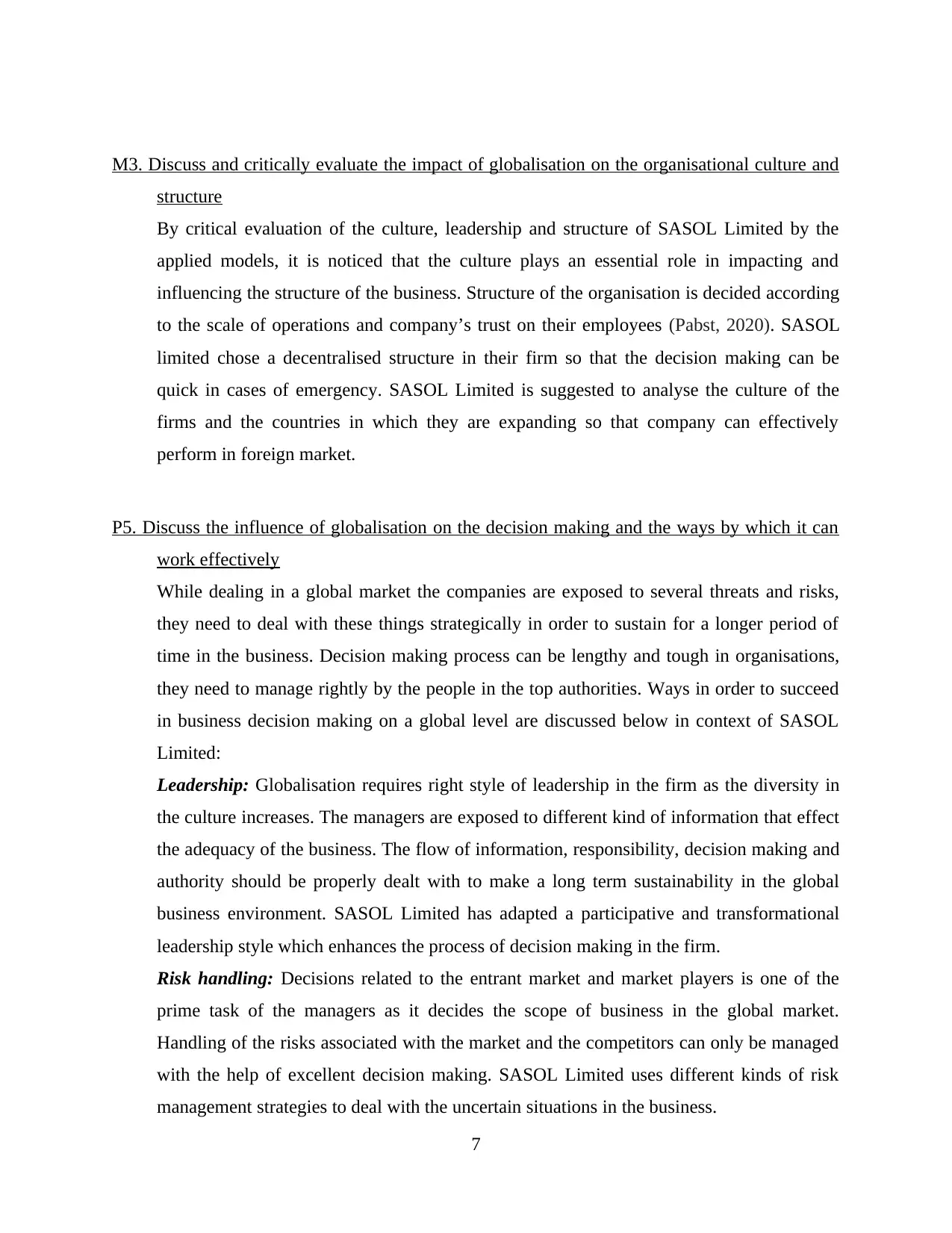
M3. Discuss and critically evaluate the impact of globalisation on the organisational culture and
structure
By critical evaluation of the culture, leadership and structure of SASOL Limited by the
applied models, it is noticed that the culture plays an essential role in impacting and
influencing the structure of the business. Structure of the organisation is decided according
to the scale of operations and company’s trust on their employees (Pabst, 2020). SASOL
limited chose a decentralised structure in their firm so that the decision making can be
quick in cases of emergency. SASOL Limited is suggested to analyse the culture of the
firms and the countries in which they are expanding so that company can effectively
perform in foreign market.
P5. Discuss the influence of globalisation on the decision making and the ways by which it can
work effectively
While dealing in a global market the companies are exposed to several threats and risks,
they need to deal with these things strategically in order to sustain for a longer period of
time in the business. Decision making process can be lengthy and tough in organisations,
they need to manage rightly by the people in the top authorities. Ways in order to succeed
in business decision making on a global level are discussed below in context of SASOL
Limited:
Leadership: Globalisation requires right style of leadership in the firm as the diversity in
the culture increases. The managers are exposed to different kind of information that effect
the adequacy of the business. The flow of information, responsibility, decision making and
authority should be properly dealt with to make a long term sustainability in the global
business environment. SASOL Limited has adapted a participative and transformational
leadership style which enhances the process of decision making in the firm.
Risk handling: Decisions related to the entrant market and market players is one of the
prime task of the managers as it decides the scope of business in the global market.
Handling of the risks associated with the market and the competitors can only be managed
with the help of excellent decision making. SASOL Limited uses different kinds of risk
management strategies to deal with the uncertain situations in the business.
7
structure
By critical evaluation of the culture, leadership and structure of SASOL Limited by the
applied models, it is noticed that the culture plays an essential role in impacting and
influencing the structure of the business. Structure of the organisation is decided according
to the scale of operations and company’s trust on their employees (Pabst, 2020). SASOL
limited chose a decentralised structure in their firm so that the decision making can be
quick in cases of emergency. SASOL Limited is suggested to analyse the culture of the
firms and the countries in which they are expanding so that company can effectively
perform in foreign market.
P5. Discuss the influence of globalisation on the decision making and the ways by which it can
work effectively
While dealing in a global market the companies are exposed to several threats and risks,
they need to deal with these things strategically in order to sustain for a longer period of
time in the business. Decision making process can be lengthy and tough in organisations,
they need to manage rightly by the people in the top authorities. Ways in order to succeed
in business decision making on a global level are discussed below in context of SASOL
Limited:
Leadership: Globalisation requires right style of leadership in the firm as the diversity in
the culture increases. The managers are exposed to different kind of information that effect
the adequacy of the business. The flow of information, responsibility, decision making and
authority should be properly dealt with to make a long term sustainability in the global
business environment. SASOL Limited has adapted a participative and transformational
leadership style which enhances the process of decision making in the firm.
Risk handling: Decisions related to the entrant market and market players is one of the
prime task of the managers as it decides the scope of business in the global market.
Handling of the risks associated with the market and the competitors can only be managed
with the help of excellent decision making. SASOL Limited uses different kinds of risk
management strategies to deal with the uncertain situations in the business.
7
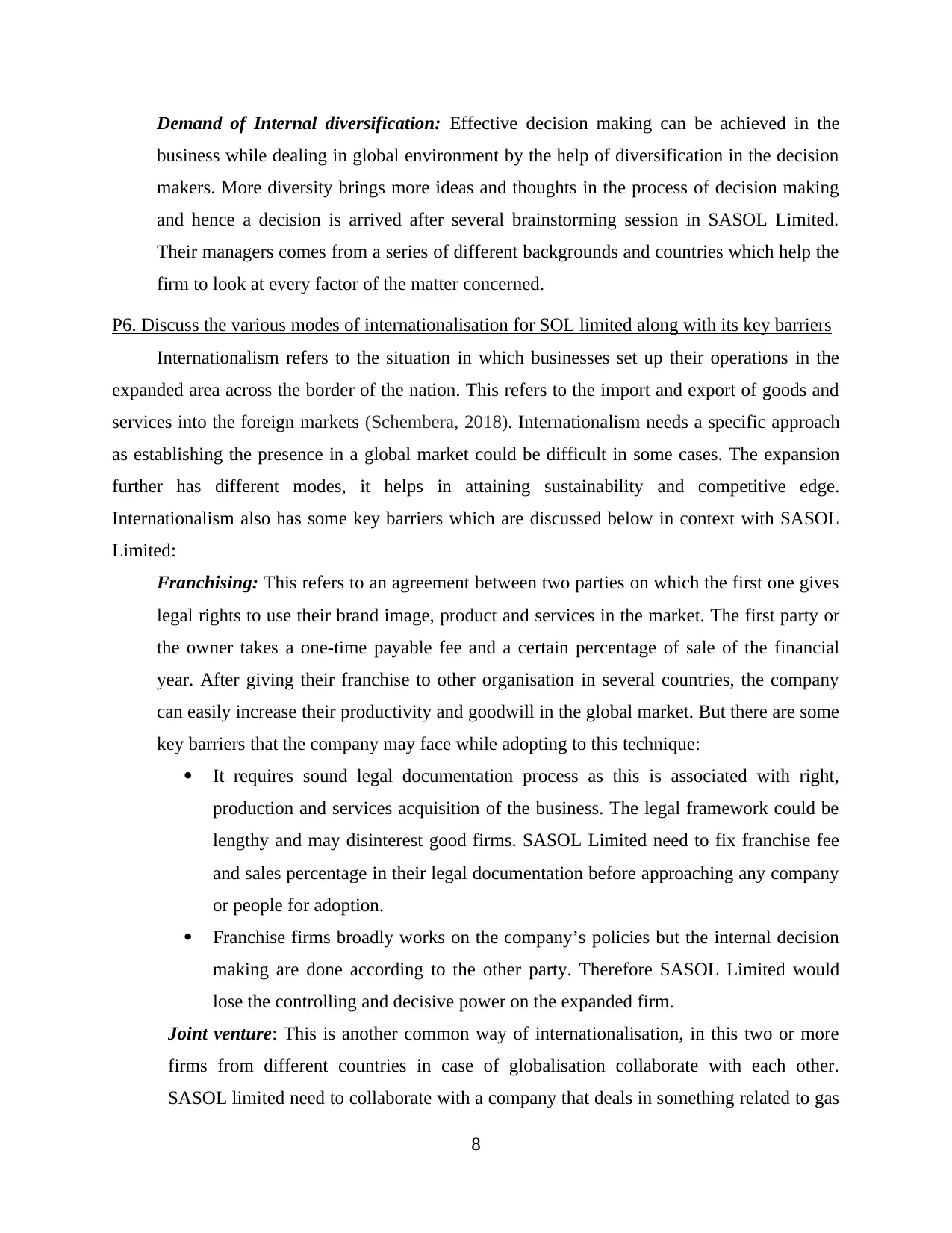
Demand of Internal diversification: Effective decision making can be achieved in the
business while dealing in global environment by the help of diversification in the decision
makers. More diversity brings more ideas and thoughts in the process of decision making
and hence a decision is arrived after several brainstorming session in SASOL Limited.
Their managers comes from a series of different backgrounds and countries which help the
firm to look at every factor of the matter concerned.
P6. Discuss the various modes of internationalisation for SOL limited along with its key barriers
Internationalism refers to the situation in which businesses set up their operations in the
expanded area across the border of the nation. This refers to the import and export of goods and
services into the foreign markets (Schembera, 2018). Internationalism needs a specific approach
as establishing the presence in a global market could be difficult in some cases. The expansion
further has different modes, it helps in attaining sustainability and competitive edge.
Internationalism also has some key barriers which are discussed below in context with SASOL
Limited:
Franchising: This refers to an agreement between two parties on which the first one gives
legal rights to use their brand image, product and services in the market. The first party or
the owner takes a one-time payable fee and a certain percentage of sale of the financial
year. After giving their franchise to other organisation in several countries, the company
can easily increase their productivity and goodwill in the global market. But there are some
key barriers that the company may face while adopting to this technique:
It requires sound legal documentation process as this is associated with right,
production and services acquisition of the business. The legal framework could be
lengthy and may disinterest good firms. SASOL Limited need to fix franchise fee
and sales percentage in their legal documentation before approaching any company
or people for adoption.
Franchise firms broadly works on the company’s policies but the internal decision
making are done according to the other party. Therefore SASOL Limited would
lose the controlling and decisive power on the expanded firm.
Joint venture: This is another common way of internationalisation, in this two or more
firms from different countries in case of globalisation collaborate with each other.
SASOL limited need to collaborate with a company that deals in something related to gas
8
business while dealing in global environment by the help of diversification in the decision
makers. More diversity brings more ideas and thoughts in the process of decision making
and hence a decision is arrived after several brainstorming session in SASOL Limited.
Their managers comes from a series of different backgrounds and countries which help the
firm to look at every factor of the matter concerned.
P6. Discuss the various modes of internationalisation for SOL limited along with its key barriers
Internationalism refers to the situation in which businesses set up their operations in the
expanded area across the border of the nation. This refers to the import and export of goods and
services into the foreign markets (Schembera, 2018). Internationalism needs a specific approach
as establishing the presence in a global market could be difficult in some cases. The expansion
further has different modes, it helps in attaining sustainability and competitive edge.
Internationalism also has some key barriers which are discussed below in context with SASOL
Limited:
Franchising: This refers to an agreement between two parties on which the first one gives
legal rights to use their brand image, product and services in the market. The first party or
the owner takes a one-time payable fee and a certain percentage of sale of the financial
year. After giving their franchise to other organisation in several countries, the company
can easily increase their productivity and goodwill in the global market. But there are some
key barriers that the company may face while adopting to this technique:
It requires sound legal documentation process as this is associated with right,
production and services acquisition of the business. The legal framework could be
lengthy and may disinterest good firms. SASOL Limited need to fix franchise fee
and sales percentage in their legal documentation before approaching any company
or people for adoption.
Franchise firms broadly works on the company’s policies but the internal decision
making are done according to the other party. Therefore SASOL Limited would
lose the controlling and decisive power on the expanded firm.
Joint venture: This is another common way of internationalisation, in this two or more
firms from different countries in case of globalisation collaborate with each other.
SASOL limited need to collaborate with a company that deals in something related to gas
8
⊘ This is a preview!⊘
Do you want full access?
Subscribe today to unlock all pages.

Trusted by 1+ million students worldwide
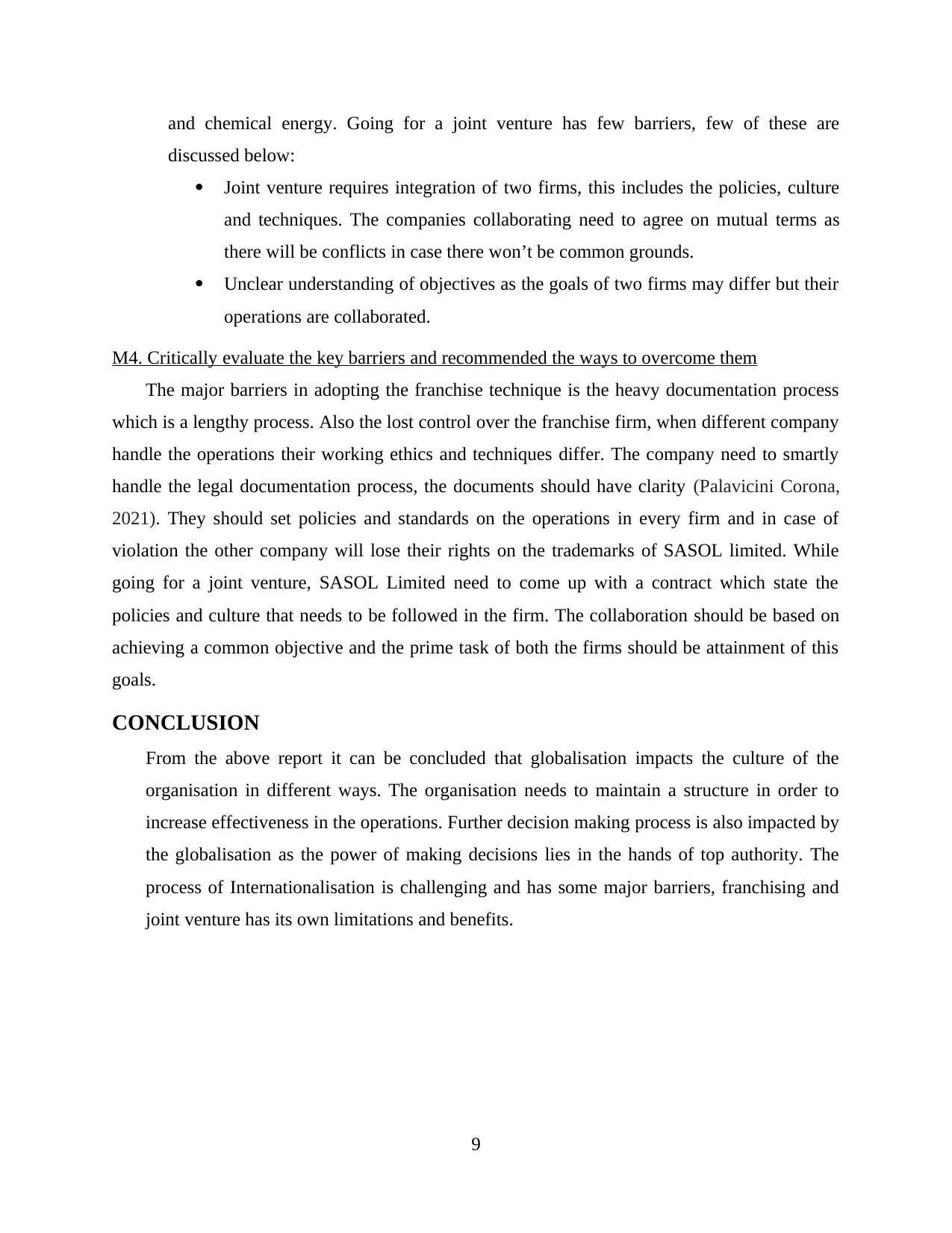
and chemical energy. Going for a joint venture has few barriers, few of these are
discussed below:
Joint venture requires integration of two firms, this includes the policies, culture
and techniques. The companies collaborating need to agree on mutual terms as
there will be conflicts in case there won’t be common grounds.
Unclear understanding of objectives as the goals of two firms may differ but their
operations are collaborated.
M4. Critically evaluate the key barriers and recommended the ways to overcome them
The major barriers in adopting the franchise technique is the heavy documentation process
which is a lengthy process. Also the lost control over the franchise firm, when different company
handle the operations their working ethics and techniques differ. The company need to smartly
handle the legal documentation process, the documents should have clarity (Palavicini Corona,
2021). They should set policies and standards on the operations in every firm and in case of
violation the other company will lose their rights on the trademarks of SASOL limited. While
going for a joint venture, SASOL Limited need to come up with a contract which state the
policies and culture that needs to be followed in the firm. The collaboration should be based on
achieving a common objective and the prime task of both the firms should be attainment of this
goals.
CONCLUSION
From the above report it can be concluded that globalisation impacts the culture of the
organisation in different ways. The organisation needs to maintain a structure in order to
increase effectiveness in the operations. Further decision making process is also impacted by
the globalisation as the power of making decisions lies in the hands of top authority. The
process of Internationalisation is challenging and has some major barriers, franchising and
joint venture has its own limitations and benefits.
9
discussed below:
Joint venture requires integration of two firms, this includes the policies, culture
and techniques. The companies collaborating need to agree on mutual terms as
there will be conflicts in case there won’t be common grounds.
Unclear understanding of objectives as the goals of two firms may differ but their
operations are collaborated.
M4. Critically evaluate the key barriers and recommended the ways to overcome them
The major barriers in adopting the franchise technique is the heavy documentation process
which is a lengthy process. Also the lost control over the franchise firm, when different company
handle the operations their working ethics and techniques differ. The company need to smartly
handle the legal documentation process, the documents should have clarity (Palavicini Corona,
2021). They should set policies and standards on the operations in every firm and in case of
violation the other company will lose their rights on the trademarks of SASOL limited. While
going for a joint venture, SASOL Limited need to come up with a contract which state the
policies and culture that needs to be followed in the firm. The collaboration should be based on
achieving a common objective and the prime task of both the firms should be attainment of this
goals.
CONCLUSION
From the above report it can be concluded that globalisation impacts the culture of the
organisation in different ways. The organisation needs to maintain a structure in order to
increase effectiveness in the operations. Further decision making process is also impacted by
the globalisation as the power of making decisions lies in the hands of top authority. The
process of Internationalisation is challenging and has some major barriers, franchising and
joint venture has its own limitations and benefits.
9
Paraphrase This Document
Need a fresh take? Get an instant paraphrase of this document with our AI Paraphraser
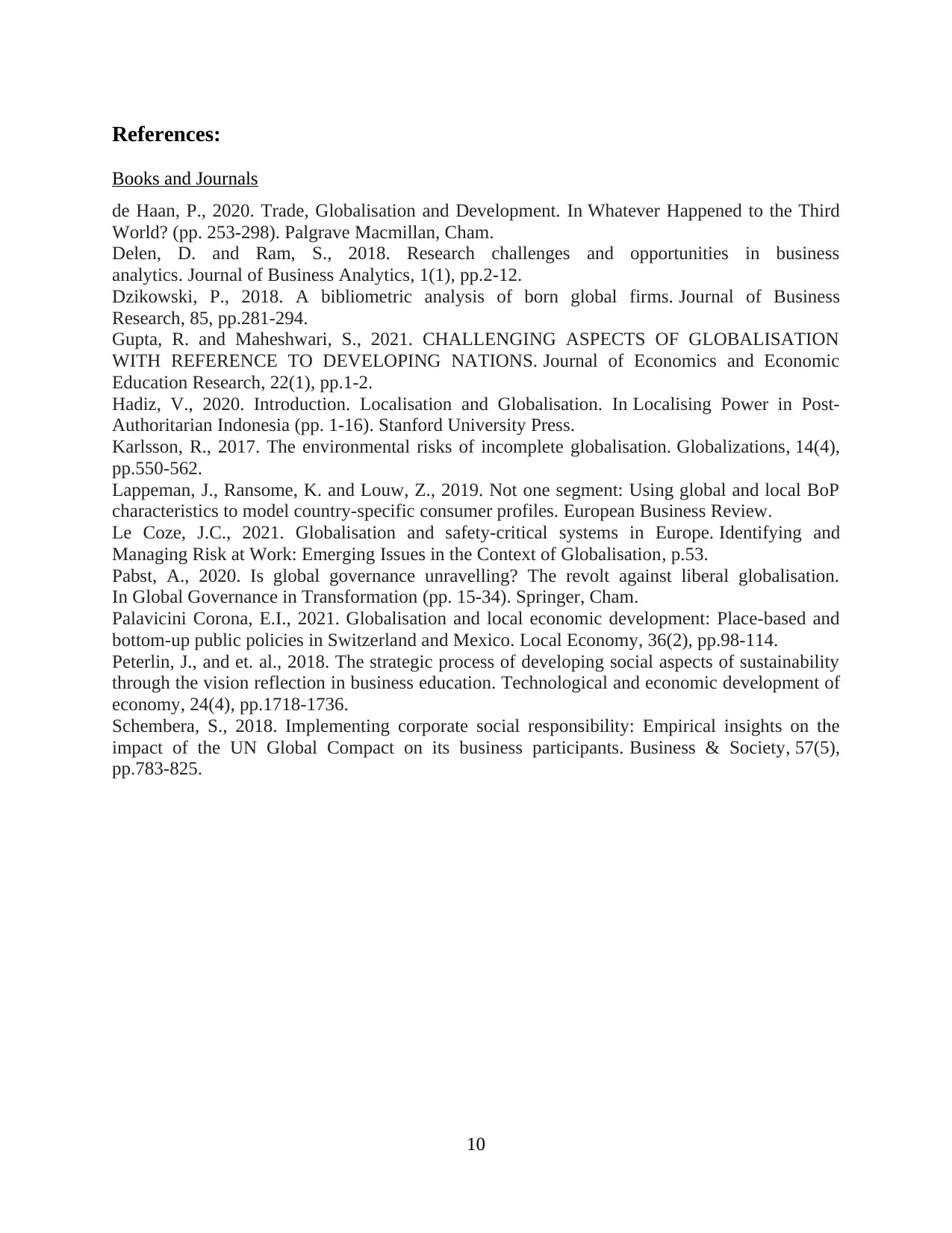
References:
Books and Journals
de Haan, P., 2020. Trade, Globalisation and Development. In Whatever Happened to the Third
World? (pp. 253-298). Palgrave Macmillan, Cham.
Delen, D. and Ram, S., 2018. Research challenges and opportunities in business
analytics. Journal of Business Analytics, 1(1), pp.2-12.
Dzikowski, P., 2018. A bibliometric analysis of born global firms. Journal of Business
Research, 85, pp.281-294.
Gupta, R. and Maheshwari, S., 2021. CHALLENGING ASPECTS OF GLOBALISATION
WITH REFERENCE TO DEVELOPING NATIONS. Journal of Economics and Economic
Education Research, 22(1), pp.1-2.
Hadiz, V., 2020. Introduction. Localisation and Globalisation. In Localising Power in Post-
Authoritarian Indonesia (pp. 1-16). Stanford University Press.
Karlsson, R., 2017. The environmental risks of incomplete globalisation. Globalizations, 14(4),
pp.550-562.
Lappeman, J., Ransome, K. and Louw, Z., 2019. Not one segment: Using global and local BoP
characteristics to model country-specific consumer profiles. European Business Review.
Le Coze, J.C., 2021. Globalisation and safety-critical systems in Europe. Identifying and
Managing Risk at Work: Emerging Issues in the Context of Globalisation, p.53.
Pabst, A., 2020. Is global governance unravelling? The revolt against liberal globalisation.
In Global Governance in Transformation (pp. 15-34). Springer, Cham.
Palavicini Corona, E.I., 2021. Globalisation and local economic development: Place-based and
bottom-up public policies in Switzerland and Mexico. Local Economy, 36(2), pp.98-114.
Peterlin, J., and et. al., 2018. The strategic process of developing social aspects of sustainability
through the vision reflection in business education. Technological and economic development of
economy, 24(4), pp.1718-1736.
Schembera, S., 2018. Implementing corporate social responsibility: Empirical insights on the
impact of the UN Global Compact on its business participants. Business & Society, 57(5),
pp.783-825.
10
Books and Journals
de Haan, P., 2020. Trade, Globalisation and Development. In Whatever Happened to the Third
World? (pp. 253-298). Palgrave Macmillan, Cham.
Delen, D. and Ram, S., 2018. Research challenges and opportunities in business
analytics. Journal of Business Analytics, 1(1), pp.2-12.
Dzikowski, P., 2018. A bibliometric analysis of born global firms. Journal of Business
Research, 85, pp.281-294.
Gupta, R. and Maheshwari, S., 2021. CHALLENGING ASPECTS OF GLOBALISATION
WITH REFERENCE TO DEVELOPING NATIONS. Journal of Economics and Economic
Education Research, 22(1), pp.1-2.
Hadiz, V., 2020. Introduction. Localisation and Globalisation. In Localising Power in Post-
Authoritarian Indonesia (pp. 1-16). Stanford University Press.
Karlsson, R., 2017. The environmental risks of incomplete globalisation. Globalizations, 14(4),
pp.550-562.
Lappeman, J., Ransome, K. and Louw, Z., 2019. Not one segment: Using global and local BoP
characteristics to model country-specific consumer profiles. European Business Review.
Le Coze, J.C., 2021. Globalisation and safety-critical systems in Europe. Identifying and
Managing Risk at Work: Emerging Issues in the Context of Globalisation, p.53.
Pabst, A., 2020. Is global governance unravelling? The revolt against liberal globalisation.
In Global Governance in Transformation (pp. 15-34). Springer, Cham.
Palavicini Corona, E.I., 2021. Globalisation and local economic development: Place-based and
bottom-up public policies in Switzerland and Mexico. Local Economy, 36(2), pp.98-114.
Peterlin, J., and et. al., 2018. The strategic process of developing social aspects of sustainability
through the vision reflection in business education. Technological and economic development of
economy, 24(4), pp.1718-1736.
Schembera, S., 2018. Implementing corporate social responsibility: Empirical insights on the
impact of the UN Global Compact on its business participants. Business & Society, 57(5),
pp.783-825.
10
1 out of 11
Related Documents
Your All-in-One AI-Powered Toolkit for Academic Success.
+13062052269
info@desklib.com
Available 24*7 on WhatsApp / Email
![[object Object]](/_next/static/media/star-bottom.7253800d.svg)
Unlock your academic potential
Copyright © 2020–2026 A2Z Services. All Rights Reserved. Developed and managed by ZUCOL.
